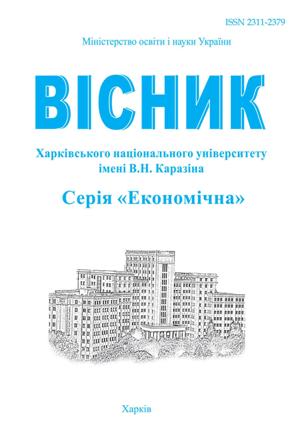Opportunism and reciprocity in economic behaviour: “Public Goods” game results - case study of Ukraine
Abstract
The article presents detailed analysis of the outcomes of Public Goods game, which was held in Ukraine in order to study the behavioural features, influencing cooperation intensity and efficiency. Experimental results agree with those of earlier research and may serve as an argument for the following conclusions. Combination of readiness for coopera-tion and inclination to punishment may lead to cooperation establishment and its stabilization, but doesn’t allow to use its potential and get a substantial effect. Considering taxation and tax policy, experimental results allow us to doubt the fact, that loosening of control and punishment is always leading to widening of tax evasion. Opportunistic behaviour of taxpayers on the post soviet area to a considerable extent is explained by the violation of the parity in the exchange of paid taxes for public goods. The results of the research were reported on the The Fifth ISBEE World Congress (Warsaw, 2012).
Downloads
References
2. Andreoni, J. Cooperation in public-goods experiments – kindness or confusion? // American Economic Review. – 1995 (85). – P. 891–904.
3. Arrow K. J. The Potentials and Limits of the Market in Resource Allocation. In: G.R.Feiwel (ed.). Issues in Contemporary Microeconomics and Welfare. London: Macmillan. – 1985. – P. 107–124.
4. David Masclet, Claude Montmarquette. Experimental Approach to the Incidence of Taxation on Labor Supply: a Comparative Study of Tax System // Economie&Prevision. – 2008/1. – Number 182.
5. Fehr E., Gintis H. Human Motivation and Social Cooperation: Experimental and Analytical Foundations // Annual Review of Sociology. – Vol. 33. – August 2007.
6. Gachter S., Herrmann B. Reciprocity, Culture and Human Cooperation: Previous Insights and New Cross-Cultural Experiment // CeDEx Discussion Paper № 2008.
7. Ledyard John O. Public goods: a survey of experimental research. In: J.H. Kagel and A.E. Roth (eds.). // The handbook of experimental economics. – Princeton University Press. – 1995.
8. Louis Levi-Garboa, Claude Montmarquette and Marie-Claire Villeval. Individual Responsibility and Taxation // Economie&Prevision. – 2008/1. – Number 182.
9. Mittoni L., Bartolami F. Free riding and norms of control: self determination and imposition. An experimental compari-son // CEEL Working Paper 4 – 07. – June 2007.
10. Mochamed Ali Bchir, Nicolas Daures and Marc Willinger. Fraud Tolerance and Tax Evasion: an Experimental Analysis of the Greenberg Model // Economie&Prevision. – 2008/1. – Number 182.
11. Ronald G. Cummings, Jorge Martinez-Vazquez and Michael McKee. Experimental Evidence on Mixing Modes in Income Tax Evasion // Public Finance Review. – 2006, Vol.34, № 6. – P. 663–686.
12. Smith V.L. Papers on Experimental Economics // Cambridge University Press, 1991. – 828 p.
13. Torgler, Benno. Speaking to theorists and searching for facts: Tax morale and tax compliance in experiments // Journal of Economic Surveys. – 2002, № 16. – P. 657–684.
14. Барсукова С.Ю. Реципрокные взаимодействия: сущность, функции, специфика// Социологические исследования. – 2004. – № 4. – C. 20–29.
15. Макаров В. Теоретические основы экспериментальной экономики // Экономист. – 1995. – №5.
16. Оливер И. Уильямсон. Поведенческие предпосылки современного экономического анализа. – THESIS, 1993, т.1, Вып. 3. – С. 39–49.

